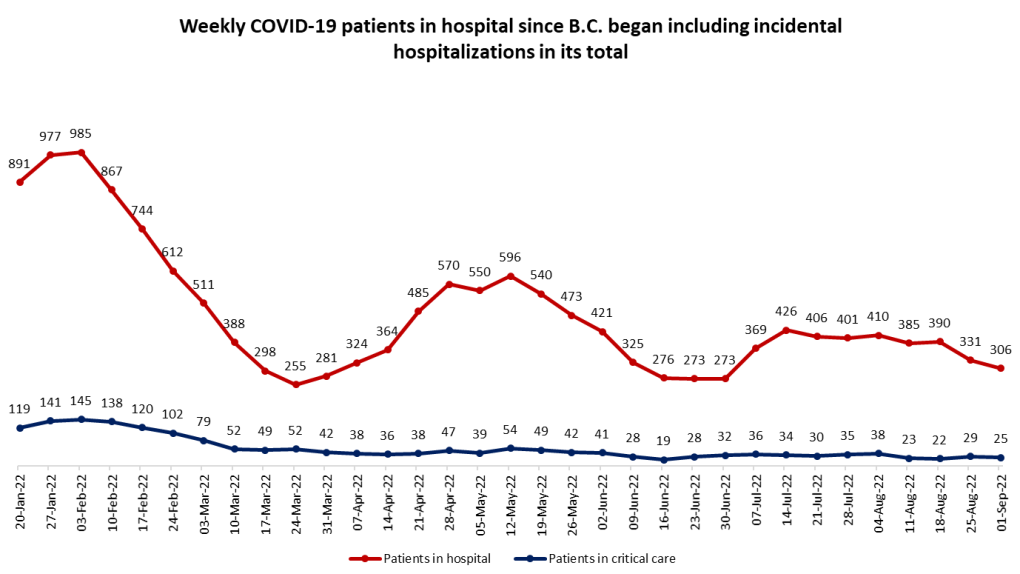Number of COVID-19 patients in B.C. hospitals reaches nine-week low
The number of patients with COVID-19 in B.C. hospitals has reached a nine-week low, as the government prepares to begin administering the first approved variant-targeting vaccine.
There were 306 coronavirus-positive patients hospitalized across the province as of Thursday, according to the B.C. Centre for Disease Control – the lowest total since June 30, when there were 273.

The total, which is released once per week on Thursdays, includes both patients who are hospitalized because of a serious COVID-19 infection and those who are admitted for other reasons and test positive incidentally.
The number of COVID-19 patients in intensive care units also decreased to 25, a drop of four from last Thursday.
Coronavirus deaths have been harder to track since the province moved to a "30-day, all-cause mortality" reporting system back in April, which means every person who died within 30 days of testing positive for COVID-19 is included in the weekly total. Vital Statistics then works to determine whether the coronavirus was their underlying cause of death, a process that can take eight weeks.
The BCCDC reported 33 deaths for the week ending on Aug. 27.
There were 651 lab-confirmed cases of the coronavirus reported during the same week, a total that only reflects people who were tested using a PCR test, and cases epidemiologically linked to them.
Because the vast majority of B.C. residents with COVID-19 symptoms don't qualify for a PCR test under the current guidelines, the weekly total is a fraction of actual transmission in the province.
The independent B.C. COVID-19 Modelling Group recently estimated the official case counts are likely off by 100-fold.
The number of reported cases has been declining for weeks, however, along with hospitalizations.
COVID-19 viral loads in Metro Vancouver wastewater, which the province has also been using to get a rough sense of transmission trends, have been on the decline as well, with some variability.
Coronavirus concentrations at treatment plants on the North Shore and in Langley decreased by 69 per cent and 62 per cent, respectively, in the latest COVID-19 situation report – but concentrations inched up by one per cent in Vancouver and surged by 24 per cent in Richmond.
"At some wastewater plants, SARS-CoV-2 viral loads may have stabilized or begun to increase after falling from their most recent peak in late-June or early-July," the report reads. "Additional results in future weeks are required to confirm this tend."
According to the BCCDC, the province administered 14,531 doses of COVID-19 vaccine from Aug. 23 to 27, or about 2,906 per day.
Some British Columbians are holding off getting their next booster so they can have a dose of Moderna's new bivalent vaccine, which is expected to be more effective against the Omicron variants that have been dominant in the province for months.
The latest guidance from the National Advisory Committee on Immunization is that adults who are recommended to receive a fall booster dose should get the bivalent vaccine – but that those who are considered at highest risk "should not delay their planned vaccination in anticipation of a bivalent Omicron-containing COVID-19 vaccine," as the original mRNA vaccines will still offer timely protection.
The Canadian government has purchased 12 million doses of Moderna’s new vaccine, and more than 10 million of those are expected to arrive by the end of September. B.C. health officials said Thursday that they expect "most people" will be able to receive a dose by the end of October.
CTVNews.ca Top Stories

U.S. Postal Service suspends accepting mail bound for Canada due to strike
The U.S. Postal Service has temporarily suspended accepting mail headed to Canada due to the strike by Canada Post workers.
Biden pardons his son Hunter despite previous pledges not to
U.S. President Joe Biden pardoned his son, Hunter, on Sunday night, sparing the younger Biden a possible prison sentence for federal felony gun and tax convictions and reversing his past promises not to use the extraordinary powers of the presidency for the benefit of his family.
Kremlin says Trump threat to BRICS nations over U.S. dollar will backfire
The Kremlin said on Monday that any U.S. attempt to compel countries to use the dollar would backfire after U.S. president-elect Donald Trump threatened to impose tariffs on BRICS countries if they created their own currency.
Ontario food banks cutting back amid 'unprecedented surge in demand'
About 40 per cent of food banks in the province have scaled back the amount of food they provide each visit amid “record-high demand,” according to a new report by Feed Ontario.
'Devastating': Missing Surrey, B.C. teen found dead, family says
The family of a missing 18-year-old, who was last seen in Surrey over a month ago, says there has been a tragic end to the search.
Elton John says he has lost his eyesight and struggles to see his new stage musical
Elton John says he struggled to watch his new musical because he has lost his eyesight after contracting an infection.
opinion Are you overpaying for subscriptions? It's time for an audit
From streaming platforms and apps to gym memberships and meal kits, subscriptions are convenient, but it's easy to overlook how much you're spending. Personal finance contributor Christopher Liew offers tips on how to audit your subscriptions to save money.
PM Trudeau 'surprised' provinces unanimous on accelerated defence spending: Ford
Ontario Premier Doug Ford says his fellow provincial leaders are united in pushing for Canada to meet its NATO defence spending targets ahead of schedule, and that Prime Minister Justin Trudeau was 'surprised' to hear it.
U.S. Great Lakes region gets yet more snow after a weekend of snarled Thanksgiving travel
Parts of the Great Lakes region saw new snow Monday and faced the prospect of even more this week after U.S. travellers battled harsh weather to get home after Thanksgiving, forecasters said.































